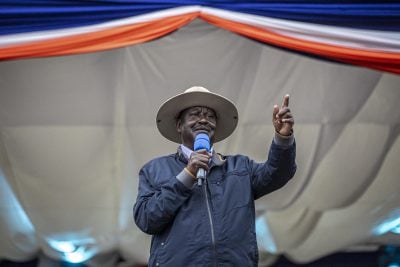This article was produced with the support of Africa Finance Corporation
Against the backdrop of a rapidly evolving energy landscape and an imperative to transition towards low-carbon technologies, Africa’s potential as a pivotal player in the global critical minerals value chain has come into sharp focus.
The sector’s enormous potential was discussed at a dialogue held on the sidelines of COP28 in the United Arab Emirates, organised by AFC and the UN Economic Commission for Africa (UNECA) alongside partners Badea, Afreximbank and the African Development Bank. Some of Africa’s leading voices in finance and extractives gathered to discuss the question of “Supercharging Africa’s Battery and Electric Vehicles Ambitions”.
In his opening remarks, Samaila Zubairu, President and CEO of AFC noted that Africa, with its abundance of minerals and renewable energy sources, can be a solution in the path towards net zero. This potential would be further enhanced with sustainable practices as well as production on the continent.
“We know that if we just focus on mining, we can derive about $11bn in value and four times that if we refine them. When we get into battery precursors, however, that becomes over $300bn in value. Cell manufacturing gets us over $1 trillion while building the cars themselves will bring about $7 trillion,” he said. To unlock this opportunity, there must be a collective agreement not to export raw materials and instead process them locally.
This, he explained, will require some crucial steps. Firstly, there have to be significant investments in data collection to determine the exact amounts of minerals that are available on the continent. Without evidence of the exact quantities, the potential may not be taken as seriously as it should and governments may allow illegal mining to flourish. There also has to be a framework for partnerships to derisk investments in the sector so that private capital can flow in.
Zubairu also called for high environmental, social, and governance (ESG) standards to ensure that communities have a sense of ownership and security threats are minimised. Finally, there has to be money to pay for all of these, he said, advocating for the leveraging of African capital in partnership with foreign sources.
“We want to work with external capital, but we must also invest our local capital. It will not make sense for us to do all of this and then watch from the sidelines. We have to be participants and the way to participate is to mobilise local investments to flow in,” he concluded.
Significant opportunity for Africa
Claver Gatete, United Nations Under-Secretary and Executive Secretary of UNECA, highlighted the significant opportunity for Africa in the battery value chain and electric vehicle development, emphasising the potential growth in this sector.
“The growth in battery and electric vehicles is forecast to reach $8.8 trillion by the year 2025 and $46 trillion by the year 2050… we cannot miss this opportunity; we must harness and move very fast to capture this market.”
Gatete outlined the progress made in the collaborative effort, including the commitment of the heads of state of the Democratic Republic of the Congo (DRC) and Zambia to develop a special economic zone for batteries and electric vehicles.
Other key milestones include the cooperation agreement between the DRC and Zambia, the establishment of the Africa Centre of Excellence for Research and Innovation on Batteries, the creation of battery councils, and the signing of a framework agreement for the special economic zones dedicated to battery production.
Bridgette Motsepe, Chair and Founder of Mmakau Mining and Ambassador of Economic Development for the Pan-African Parliament, made a passionate call for structural changes that would prioritise local ownership and participation. She recalled the challenges that South Africa faced post-independence in 1994, inheriting mining legislation dominated by a few companies. She stressed the importance of changing laws not merely for exploitation but for beneficiation and local value addition.
Despite the initial challenges, Motsepe said South Africa had made some positive changes, with a new mining charter which stipulates that mining ventures must have at least 30% local ownership, in addition to social and labour plans, reinvestment in skills transfer and community development.
Financing solutions
On the question of the most effective financing solutions to power Africa’s electric ambitions, Frannie Leautier, Partner and CEO of SouthBridge Investment, proffered three suggestions. The first is to use the inherent value of minerals in Africa to finance investments in the sector. She suggested establishing contracts that account for the future value of minerals, transforming them on the continent, and channelling the proceeds to support various sectors dependent on those minerals.
She emphasised the unique opportunity for Africa to internally transform minerals, saying, “we have the only continent that has so many of these minerals that we could transform the entire transport, energy and shipping sectors by using them internally.”
Another way, she said, is to structure financing in a way that makes it attractive to local institutional investors, such as pension funds. By aligning financing structures with the preferences and scale requirements of institutional investors, it becomes possible to attract significant capital. It is also possible to leverage philanthropic financing, Leautier said, citing the Motsepe Foundation as an example.
Yvonne Ike, Managing Director and Head of Sub Saharan Africa at Bank of America Merrill Lynch, said it is important to conduct an evaluation audit of existing assets and minerals in the region. Using the example of a diamond in the Central African Republic that was sold for $400,000 but ended up selling for $400m at auction within a year, she called for a comprehensive understanding of Africa’s mineral wealth, stressing, “we need an evaluation audit of the assets that we have today.”
DRC faces up to challenges
Tosi Mpanu Mpanu, Director of Health, Safety and Environment at Entreprise Générale du Cobalt (EGC) said the DRC one of the most mineral-endowed countries in the world, recognises that it has to play its role in creating these value chains on the continent, observing, however, that “we have three keys to unlock – one being finance, competencies and capacity and lastly energy. In response to these challenges, the government has forged strategic partnerships with UNECA, AFC, Afreximbank and other institutions to address these shortfalls.”
The DRC, Mpanu said, is mirroring the approach taken by Zambia, establishing a special economic zone, a council of batteries setting the right standards for participation in the sector. Looking ahead, Mpanu acknowledged that cobalt’s reign may not be for long. “We do realise that the window of opportunity that we have is closing because technology is advancing and people are looking for alternatives to cobalt. It’s Important that we work closely with our partners and the Africa Centres of Excellence to look at technology development to ensure that the DRC remains relevant,” he said.

 Sign in with Google
Sign in with Google 



